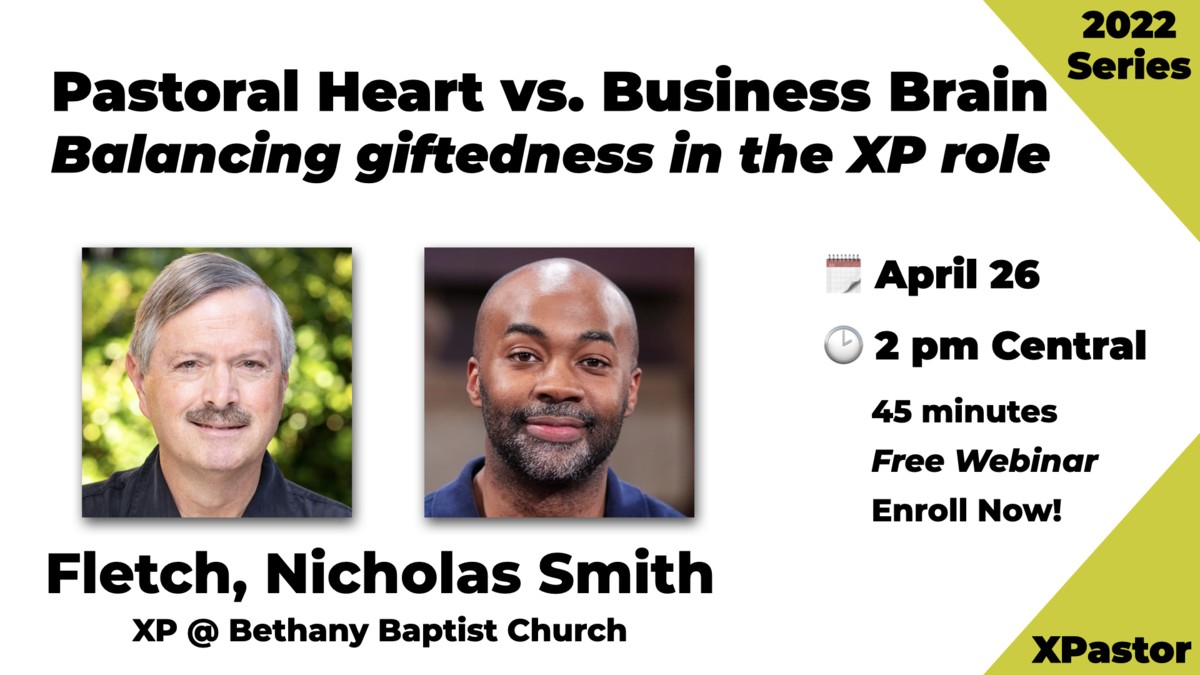Pastors have been on the scene for a couple thousand years. Executive Pastors, by many different definitions, have been around for about twenty-five years. We obviously know more about how to be the former than the latter.
Understanding the role and whether or not you need an Executive Pastor, begins with clarity of definition. Let me start by separating what is often combined—that is, the church Business Administrator and the Executive Pastor. There are many variations of Church Administrator from “finance guy” to “business dude.” Written more formally, if you prefer, from CFO to Operations Manager. The following five points will serve as a general job description for the typical Business Administrator. Each church can adjust to meet their own needs and/or the gifts and skills of the person hired.
Business Administrator:
- Church finances
- Buildings and grounds
- Information technology
- General office management/some HR
- Special projects (directed by the Senior Pastor and XP only)
In contrast, the XP takes on more of the role of staff coach. Depending on the size of your church, the XP may have a number of different responsibilities, including some primary ministry roles. For example, when I began as XP at Skyline Church, I also oversaw small groups, men’s ministry, membership, and taught a large class. Currently at 12Stone® Church, with over one hundred on staff, my responsibilities as XP more than consume my time.
In my opinion, if your church does not yet average close to 1,200 in attendance, it’s too soon for you to have an XP (this is not a legalistic number, but is a well-tested guideline). It is certainly too soon to have an XP that does not additionally carry primary ministry responsibilities other than XP roles. When churches attempt to hire an XP too soon, they often ask the person to do both the role of Business Administrator and XP. This makes sense financially because you can’t justify (or afford) two salaries, but you will likely run into a common problem. The person you have in that dual role is far better suited for either Business Administrator or XP, but not both. This may be fine when the church is smaller, for example, from 750 to 1,000, but as you approach 1,200, it’s not the weight of all the work that will get you in trouble, it’s that he or she is not wired or gifted to do both. You may think that the solution is simple. When the church crosses 1,200-1,300 or so, hire the other role. Not so easy. In nearly every scenario I’ve consulted, the incumbent is asked which role they want—and nearly every time they choose XP. The problem is that in most cases, they are better designed for the role of Business Administrator. Now you have, at best, an awkward situation.
A better solution, if you are convinced you want these positions before 1,200 or so in attendance, is to hire a part time Business Administrator and a full time XP who also carries significant ministry responsibilities. As the church grows, the XP hires staff and begins to delegate those ministry roles; at the same time, the Business Administrator slowly increases hours to a full time role. Personally, I think you are better to hire the part time Business Administrator and wait to hire an XP until you are strongly past 1,200 in attendance. But hey, you are in charge … it’s your church!
By the time you are averaging 1,800 in attendance, you are probably late in adding an XP to the team. You may be experiencing problems or even be stuck or plateaued.
From a macro, big picture point of view, there are three primary responsibilities of an XP; these are all underneath the larger umbrella of serving the Senior Pastor by removing major responsibilities from his plate.
- Chief of Staff (hiring, firing, morale, culture, training, performance and salary review, etc.)
- Ministry design and implementation (leading the decision-making processes for what ministries the church does and does not do, evaluation and continual improvement of the ministries, processes, monitoring stats, etc.)
- Leadership development (the focus is the staff, but if this is a sweet spot for the XP, then for the whole church as well)
When you add to these three areas of responsibility any requests of the Senior Pastor for specific ministry initiatives, this is a full set of responsibilities as your church climbs to, and over, 2,000 in attendance.
When I joined the team at 12Stone, we were averaging about 1,400 in attendance. I was their first XP. The way our Senior Pastor Kevin Myers (“PK”) describes the transition is that he gave me half of his job. PK was then able to invest his time and energy more deeply into prayer and hearing from God, overall vision and leadership, primary communication of weekend messages, developing stewardship, and passion for evangelism.
When the church should not pursue an XP:
- If the Senior Pastor is easily intimidated or insecure.
- If the church is not large enough.
- If the congregation has just called a new Senior Pastor.
- If the Senior Pastor views staff development as a “non-essential.”
- If the Senior Pastor has lost interest in everything but preaching.
- If the board sees this as an answer to jump-starting a church that has plateaued or in decline.
- If the Senior Pastor just doesn’t want to be bothered by the details.
- If the church seeks a solution for a pastor who is highly focused on interests outside the church.
- If the Senior Pastor or board sees it as an answer to resolving relational conflict.
Good reasons to pursue an XP:
- The demands (scope and breadth) of the ministry have grown significantly due to the increasing size of the church.
- The pressure is rising, things are falling through the cracks, and the pastor is not able to focus and develop his or her greater gifts.
- The Senior Pastor is wired to delegate and empower authority and major responsibilities in order to see the church continue to grow.
- The staff and ministries would benefit in clear and measurable ways from the addition of an XP.
- You sense God’s favor on the idea.
With all this said, I will close by saying that few things trump the importance of the unique relationship the Senior Pastor and XP share. The chemistry must be great and the trust must be high or it’s not going to work. When the relationship is strong, there is nothing quite as fun and productive. I’ve been blessed with two such relationships, first with John Maxwell and now with Kevin Myers. Take your time and hire wisely.











